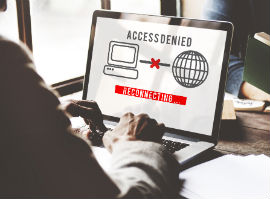
Since the turn of the decade, Austria has been grappling with the controversial issue of pirate site blocking.
While rights holders have long-insisted that blocking is an appropriate and proportionate response to large-scale infringement, local Internet service providers have remained unconvinced, despite many legal processes.
November 2017, the Supreme Court finally ruled that The Pirate Bay and other “structurally-infringing” sites including 1337x.to can indeed be
The Telecom Single Market (TSM) Regulation established the principle of non-discriminatory traffic management in the EU. It does allow for the blocking of copyright-infringing websites but only when supported by a clear administrative or judicial decision.
However, rights holders have also written to ISPs in Austria demanding that they block sites that are potentially related to a blocked platform (such as a mirror or proxy) but aren’t specifically detailed in an official order.
Last January, this problem finally came to head when, after ‘voluntarily’ blocking several Pirate Bay clones, ISP T-Mobile reported itself to the Austrian Regulatory Authority for Broadcasting and Telecommunications (RTR) for a potential net neutrality breach. As reported by Tarnkappe, other providers including A1, Drei, Kabelplus, Liwest, and UPC later followed suit.
“The decision of the providers to self-disclose may seem surprising at first glance,” says Maximilian Schubert, Secretary General of Internet Service Providers Austria (ISPA).
“However, this self-disclosure will hopefully open the eyes of many people entrusted with the topic of how unclear and almost worrying the situation is in this country.”
At issue is whether local ISPs are obliged to block ‘pirate’ sites following an informal request from rights holders and in the absence of an official order. It now transpires, thanks to pressure from the ISPs, that they do not have to block following such requests.
Telecoms regulator Telecom Control Commission will now get involved when a block is requested which will lead to a supervisory process and a full review by the agency. Informal blocking of domains following a simple request from rights holders is therefore ruled out.
“From ISPA’s point of view, this has sent another clear signal that network blocking constitutes a serious infringement of fundamental rights,” Schubert says.
“To rely on an informal system of ‘bartering’ in such a sensitive matter, as the rights holders have requested, is simply incompatible with the principles of a modern constitutional state. It is now up to the legislator, while respecting the fundamental rights concerned, to find a solution that takes account of the different interests.”
Moving forward, ISPA says that ISPs want an “independent judicial body” to confirm in advance the legality of any blocking while ensuring that a minimum of time and resources are expended on the blocking process
“In addition, users need to be able to clearly understand why they are being blocked and thus have the opportunity to fight the block directly at the crucial point. Furthermore, the providers must be compensated for their costs and protected against any claims of third parties,” ISPA concludes.





